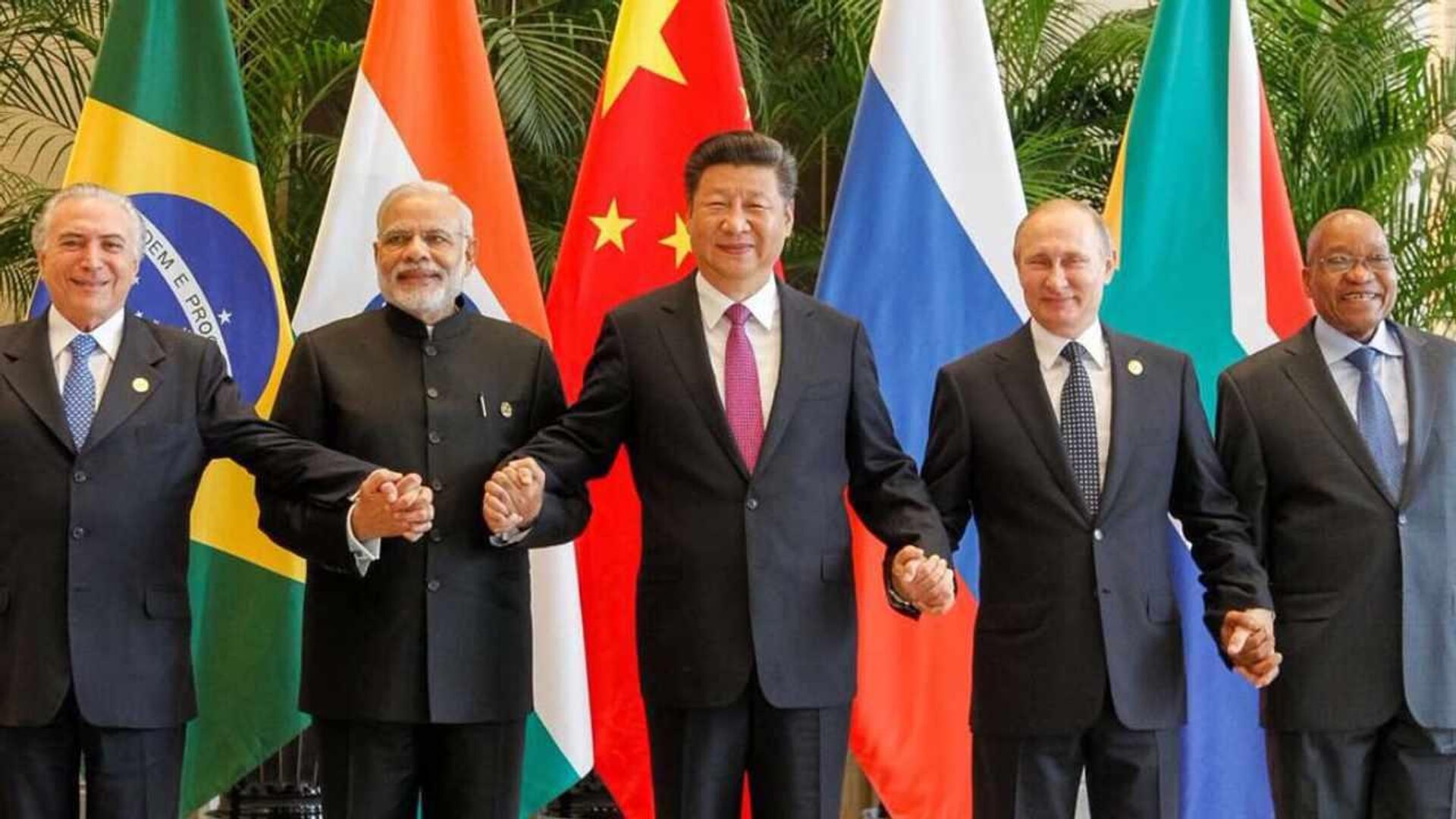https://sputniknews.in/20240701/whats-fueling-southeast-asias-brics-pivot-7743692.html
What's Fueling Southeast Asia's BRICS Pivot?
What's Fueling Southeast Asia's BRICS Pivot?
Sputnik India
Multiple Southeast Asian countries, including Thailand and Malaysia, have showcased their interest in joining the BRICS bandwagon amid the powerful economic bloc's expansion drive.
2024-07-01T19:09+0530
2024-07-01T19:09+0530
2024-07-01T19:21+0530
sputnik opinion
thailand
asean
india
brics
bimstec
the united nations (un)
brics expansion
new delhi
south africa
https://cdn1.img.sputniknews.in/img/07e8/07/01/7748682_0:0:1280:720_1920x0_80_0_0_51129f0f9f992043749ef353eb38d570.jpg
Among the keen interest of several Southeast Asian countries, including the Kingdom of Thailand and Malaysia, to join BRICS, according to experts, is the movement towards multipolar world, aim to reshape the global order as well as the economic component of the states.Increased focus of South East Asia's to latch on to the membership of BRICS, is rooted in commitment to multilateralism and a potential of promoting economic growth, Seksan Anantasirikiat, who is a strategic researcher at International Studies Center (ISC) in Thailand told Sputnik India.Anantasirikiat observed that ASEAN group aspiration to foster cooperation with key developing nations and emerging economies by increasing the leverage of developing countries in global governance. Moreover, they aspire to participate in shaping a global order that is equitable, open, and interconnected, leading to shared benefits for all.Citing the The Asia Foundation survey, the analyst noted, that another explanation of the Kingdom's eager to join BRICS is based on domestic justification. To increase economic growth is the most important foreign policy priority among the Thai public, therefore, joining the regional bloc is relevant to its people's expectations, moted Anantasirikiat, who also serves as the Director of Public Relations of the Korean Association of Thai Studies (KATS), noted.ASEAN's Precedence: Development and Economic GrowthThe pundit emphasised that ASEAN's and Thailand's approach to multilateralism is open and inclusive – to welcome all and threaten none. For instance, according to the Perception Survey by Foreign Policy Community of Indonesia (FPCI) and Economic Research Institute for ASEAN and East Asia (ERIA) in 2023 found that people living in the association nations prefer any initiatives or projects that put forth development and economics as priorities.Anantasirikiat reckoned that the application of BRICS and the Organization for Economic Cooperation and Development (OECD) membership would help highlight Thailand's role as a bridge-builder and connector between different groups of states.Bangkok to Elevate Ties with New DelhiThailand shares strong ties with India, especially at the cultural and historical levels. As one of the founding members of BRICS, New Delhi's support could guarantee the Kingdom a place in the organization.The pundit acknowledged that the state was seeking support from "all relevant actors", underlying India's influence in the organisation.According to Anantasirikiat, the current relations between the two nations has been gaining momentum to promote mutual benefits. For example, both the countries set the goal to double bilateral trade to 35 billion USD by 2027.In terms of people-to-people connections, in 2023 over 1.6 million Indian tourists could visit Thailand resulted from the Kingdom's temporary visa exemption scheme.BRICS' Expansion ModeIt is worth noting that Anantasirikiat's remarks come in the backdrop of recent statements made by Thai and Malaysian officials about joining BRICS.Late last month, Thailand's foreign ministry spokesperson Nikorndej Balankura confirmed that the Kingdom has made a formal request to become a part of BRICS.Similarly, Malaysia Prime Minister Anwar Ibrahim publicly announced Kuala Lumpur's intention to BRICS membership.Among other countries that are reportedly considering a similar move are Vietnam and Cambodia.Since being formed as a five-nation grouping comprising Brazil, Russia, India, China, and South Africa, BRICS launched its first expansion drive last year, inducting Ethiopia, Egypt, Iran, Saudi Arabia, and the United Arab Emirates (UAE) as its newest members on January 1 this year.
https://sputniknews.in/20240619/dedollarisation-economic-diversification-attract-malaysia-to-brics-7654465.html
thailand
asean
india
new delhi
south africa
southeast asia
china
russia
uae
the united arab emirates (uae)
malaysia
Sputnik India
feedback.hindi@sputniknews.com
+74956456601
MIA „Rossiya Segodnya“
2024
Pawan Atri
https://cdn1.img.sputniknews.in/img/07e6/0c/13/139630_147:0:831:684_100x100_80_0_0_8fa2b25903e7787fe6a2698552c167df.png
Pawan Atri
https://cdn1.img.sputniknews.in/img/07e6/0c/13/139630_147:0:831:684_100x100_80_0_0_8fa2b25903e7787fe6a2698552c167df.png
News
en_IN
Sputnik India
feedback.hindi@sputniknews.com
+74956456601
MIA „Rossiya Segodnya“
Sputnik India
feedback.hindi@sputniknews.com
+74956456601
MIA „Rossiya Segodnya“
Pawan Atri
https://cdn1.img.sputniknews.in/img/07e6/0c/13/139630_147:0:831:684_100x100_80_0_0_8fa2b25903e7787fe6a2698552c167df.png
thailand brics, brics thailand, brics membership drive, southeast asia brics, brics expansion in south east asia, south east asia brics expansion, malaysia brics, brics summit, brics news, brics expansion, brics dedollarisation, dedollarisation news, asean news, brics countries, global south, asian monetary fund, malaysia news, malaysia china trade
thailand brics, brics thailand, brics membership drive, southeast asia brics, brics expansion in south east asia, south east asia brics expansion, malaysia brics, brics summit, brics news, brics expansion, brics dedollarisation, dedollarisation news, asean news, brics countries, global south, asian monetary fund, malaysia news, malaysia china trade
What's Fueling Southeast Asia's BRICS Pivot?
19:09 01.07.2024 (Updated: 19:21 01.07.2024) Multiple Southeast Asian countries have shown their interest in joining the BRICS bandwagon amid the powerful economic bloc's expansion drive.
Among the keen interest of several Southeast Asian countries, including the Kingdom of Thailand and Malaysia, to join BRICS, according to experts, is the movement towards multipolar world, aim to reshape the global order as well as the economic component of the states.
Increased focus of South East Asia's to latch on to the membership of BRICS, is rooted in commitment to multilateralism and a potential of promoting economic growth, Seksan Anantasirikiat, who is a strategic researcher at International Studies Center (ISC) in Thailand told Sputnik India.
"ASEAN countries always adhere to multilateralism in their foreign policy. Having many partners will help the member states exercise their agency in the age of geopolitical competition," a Bangkok-based expert has said.
Anantasirikiat observed that ASEAN group aspiration to foster cooperation with key developing nations and emerging economies by increasing the leverage of developing countries in global governance. Moreover, they aspire to participate in
shaping a global order that is equitable, open, and interconnected, leading to shared benefits for all.
Citing the The Asia Foundation survey, the analyst noted, that another explanation of the Kingdom's eager to join BRICS is based on domestic justification. To increase economic growth is the most important foreign policy priority among the Thai public, therefore, joining the regional bloc is relevant to its people's expectations, moted Anantasirikiat, who also serves as the Director of Public Relations of the Korean Association of Thai Studies (KATS), noted.
ASEAN's Precedence: Development and Economic Growth
The pundit emphasised that ASEAN's and Thailand's approach to multilateralism is open and inclusive – to welcome all and threaten none. For instance, according to the
Perception Survey by Foreign Policy Community of Indonesia (FPCI) and Economic Research Institute for ASEAN and East Asia (ERIA) in 2023 found that people living in the association nations prefer any initiatives or projects that put forth
development and economics as priorities.
Anantasirikiat reckoned that the application of BRICS and the Organization for Economic Cooperation and Development (OECD) membership would help highlight Thailand's role as a bridge-builder and connector between different groups of states.
"The country aims to explore synergies between the two blocs, such as development cooperation and multilateral cooperation, and with other regional frameworks, such as ASEAN, BIMSTEC, APEC, and the Asia Cooperation Dialogue (ACD), and multilateral frameworks, such as the Group of 77 at the UN," the think tanker suggested.
Bangkok to Elevate Ties with New Delhi
Thailand shares strong ties with India, especially at the cultural and historical levels. As one of
the founding members of BRICS,
New Delhi's support could guarantee the Kingdom a place in the organization.
The pundit acknowledged that the state was seeking support from "all relevant actors", underlying India's influence in the organisation.
According to Anantasirikiat, the current relations between the two nations has been gaining momentum to promote mutual benefits. For example, both the countries set the goal to double bilateral trade to 35 billion USD by 2027.
In terms of people-to-people connections, in 2023 over 1.6 million Indian tourists could visit Thailand resulted from the Kingdom's temporary visa exemption scheme.
"India is a regional key player due to its economic potential and the country’s aspiration to have a significant role in the region. Therefore, Bangkok is eager to elevate its relationship with New Delhi in several areas that could gear towards a strategic partnership," he summed up.
It is worth noting that Anantasirikiat's remarks come in the backdrop of recent statements made by Thai and Malaysian officials about joining BRICS.
Late last month, Thailand's foreign ministry spokesperson
Nikorndej Balankura confirmed that the Kingdom has made a formal
request to become a part of BRICS.
Similarly, Malaysia Prime Minister
Anwar Ibrahim publicly announced Kuala Lumpur's intention to BRICS membership.
Among other countries that are reportedly considering a similar move are Vietnam and Cambodia.
Since being formed as a five-nation grouping comprising Brazil, Russia, India, China, and South Africa, BRICS launched its first expansion drive last year, inducting Ethiopia, Egypt, Iran, Saudi Arabia, and the United Arab Emirates (UAE) as its newest members on January 1 this year.



